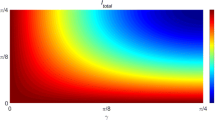Abstract
In this paper, we provide an operational criterion for controlled dense coding (CDC) with a general class of three-qubit partially entangled states. A general three-qubit pure entangled state can be classified into two inequivalent classes according to their genuine tripartite entanglement. We claim that if a three-qubit state shows entanglement characteristic similar to Greenberger–Horne–Zeilinger (GHZ)-class, then such non-trivial tripartite states are useful in CDC whereas states belonging to the W-class are not useful for that. We start with a particular class of non-trivial partially entangled states belonging to the GHZ-class and show that they are effective in CDC. Then we cite several other examples of different types of tripartite entangled states to support our conjecture.
Similar content being viewed by others
References
C H Bennett and S J Wiesner, Phys. Rev. Lett. 69, 2881 (1992)
K Mattle, H Weinfurter, P G Kwiat and A Zeilinger, Phys. Rev. Lett. 76, 4656 (1996)
J-C Hao, C-F Li and G-C Guo, Phys. Rev. A 63, 054301 (2001)
D Bouwmeester, J-W Pan, M Daniell, H Weinfurter and A Zeilinger, Phys. Rev. Lett. 82, 1345 (1999)
A Acin, E Jane, W Dür and G Vidal, Phys. Rev. Lett. 85, 4811 (2000)
W Dür, G Vidal and J I Cirac, Phys. Rev. A 62, 062314 (2000)
C H Bennett, H J Bernstein, S Popescu and B Schumacher, Phys. Rev. A 53, 2046 (1996)
X-P Zang, M Yang, C-Q Du, Mn Wang, S-D Fang and Z-L Cao, Pramana – J. Phys. 86, 1009 (2016)
H Fu, P-C Ma, G-B Chen, X-W Li and Y-B Zhan, Pramana – J. Phys. 88: 92 (2017)
C Fu, Y Xia, B Liu and S Zhang, J. Korean Phys. Soc. 46, 1080 (2005)
D-Y Jiang, R S Wu, S S Li and Z S Wang, Int. J. Theor. Phys. 48, 2297 (2009)
X-W Liu, Int. J. Theor. Phys. 54, 1253 (2015)
J Liu, Z-W Mo and S-Q Sun, Int. J. Theor. Phys. 55, 2182 (2016)
D Liu, Int. J. Theor. Phys. 54, 2784 (2015)
Y-Y Nie, Y-H Li, X-P Wang and M-H Sang, Quantum Inf. Process. 12, 1851 (2013)
S Roy and B Ghosh, Int. J. Quantum Inf. 13, 1550033 (2015)
D M Greenberger, M A Horne and A Zeilinger, Bell’s theorem, quantum theory and conceptions of the universe edited by M Kafatos (Springer, Netherlands, 1989), Fund. Theor. of Phys., ISBN 978-94-017-0849-4
X-H Li and S Ghose, Phys. Rev. A 90, 052305 (2014)
V Coffman, J Kundu and W K Wootters, Phys. Rev. A 61, 052306 (2000)
R Lohmayer, A Osterloh, J Siewert and A Uhlmann, Phys. Rev. Lett. 97, 260502 (2006)
C Eltschka, O Osterloh, J Siewert and A Uhlmann, New J. Phys. 10, 043014 (2008)
A K Pati, P Parashar and P Agrawal, Phys. Rev. A 72, 012329 (2005)
L Li and D Qiu, J. Phys. A 40, 10871 (2007)
J S Kim, G Gour and B C Sanders, Contemp. Phys. 53, 417 (2012)
Acknowledgements
M M Ali acknowledges the support from the Ministry of Science and Technology of Taiwan and the Physics Division of National Center for Theoretical Sciences, Taiwan.
Author information
Authors and Affiliations
Corresponding author
Rights and permissions
About this article
Cite this article
Roy, S., Ghosh, B. & Ali, M.M. Operational criterion for controlled dense coding with non-trivial tripartite entangled states. Pramana - J Phys 91, 50 (2018). https://doi.org/10.1007/s12043-018-1630-1
Received:
Revised:
Accepted:
Published:
DOI: https://doi.org/10.1007/s12043-018-1630-1
Keywords
- Greenberger–Horne–Zeilinger-states
- W-states
- partially entangled states
- maximal sliced states
- symmetric states
- controlled dense coding




